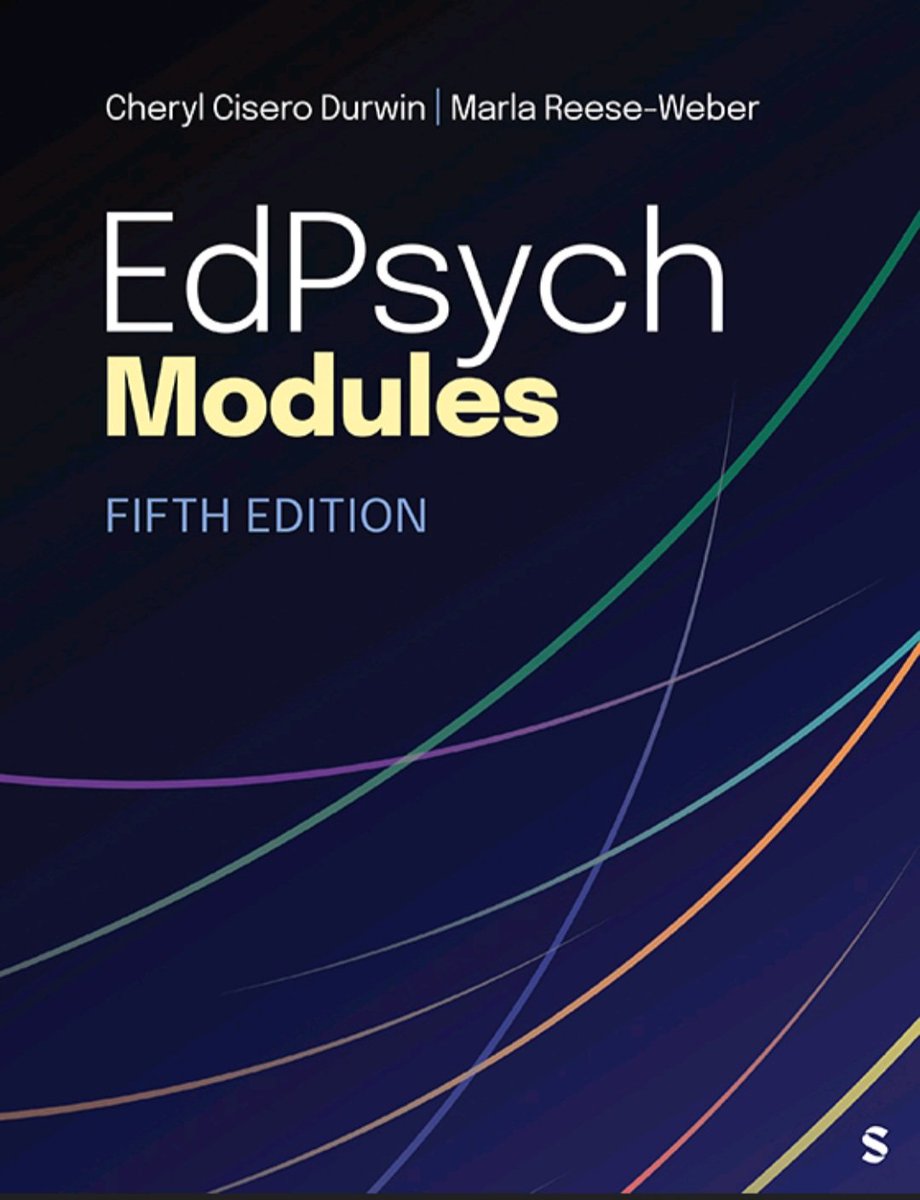#edpsychmodules search results
This is why I will continue to cover the #learningstylesmyth in #EdPsychModules published by @SageEducation.



There is no such thing as a "visual learner." While students may have learning style *preferences* (e.g., visual vs. verbal), they do not actually learn better when receiving information via their preferred learning style. This has been empirically tested over and over again.…

To answer your question @Apatim56, here's an explanation of the #learningstylesmyth from #EdPsychModules. Hope this is helpful.



Yes, agreed, @MrDanielBuck. The #learningstylesmyth is the #1 myth in the Top 10 Education Myths Debunked in #EdPsychModules, 5th ed published by @SageEducation.

THERE’S NO SUCH THING AS LEARNING STYLES Stop, stop, stop, just stop with that pseudoscience
This is why I continue to cover the #learningstylesmyth in #EdPsychModules 5th ed published by @SageEducation It's #1 on my list of #edumyths.

THERE’S NO SUCH THING AS LEARNING STYLES Stop, stop, stop, just stop with that pseudoscience
Right. It's called #seductivedetails and it detracts from #learning, as we discuss in #EdPsychModules, 5th ed published by @SageEducation.
Tip of the Day: When using Google Slides in the classroom, the ease with which students can understand the goal should always come before decoration. Anything on the slide that distracts students from the lesson goal should be removed. WHY? Heavily ornamented slides with moving…
Your daughter might like your book better if you put her in it. My daughter would say so. Lol. Here she is in #EdPsychModules circa first grade (now 21).

This is why I will continue to cover the #learningstylesmyth in #EdPsychModules published by @SageEducation.


Right. It is most effective to provide application activities or inquiry/problem-solving after explicit instruction. Students need prior #knowledge and a sufficient level of fluency with concepts to work with. #EdPsychModules



It weirdly annoys folks when it’s suggested that explicit instruction tends to end with an application phase that looks a lot like the inquiry based learning they cherish. People want explicit instruction to be a boogeyman to further their science-free agenda.
Yes, thanks for pointing that out, @MrZachG. #teachers, you can learn about how to effectively use #workedexamples in #EdPsychModules (Module 12).

Maybe preservice #teachers need #educationalpsychology taught by psych, not education, departments? #EdPsychModules

University education colleges have the weakest pedagogical knowledge You can’t make this up. 🤦♂️😓 (highest standard deviation though, implying there is some hope that there are some well-informed professors well placed to lead change)

This is why I will continue to address the most pervasive #education #myths in #EdPsychModules (5th ed) published by @SageEducation. So much work left to be done!


*NEW POST* - The Enduring Persistence of Neuromyths in Education. A new study surveying over 3,000 Spanish teachers provides one of the most detailed snapshots to date of educational misconceptions in the field. Link in reply ⬇️

Great article on grouping students by reading skill level. Everything old is new again. This is the #regrouping method. We cover this in #EdPsychModules (Module 19 on grouping practices). Good to see it being used in practice.
HOORAY FOR THIS We Started Grouping Students by Reading Ability vs. Grade. Here’s What Happened the74million.org/article/we-sta… @NAGCGIFTED @JonathanPlucker @ehanford @rpondiscio @MrDanielBuck
I'm still continually amazed that what we researchers have known for decades about #automaticity of skills (e.g., in reading, math) has only recently become "mainstream" and that many #teachers still have a problem understanding the importance of this concept. #EdPsychModules
🎯 "[If] a lot of your brain power is going to decoding the words, you have less brain power to use to understand the meaning of the sentence." This applies to reading, math, everything really. As Hattie & Yates (2013) so eloquently put it: "You cannot comprehend a 'big…
![justinskycak's tweet image. 🎯 "[If] a lot of your brain power is going to decoding the words, you have less brain power to use to understand the meaning of the sentence."
This applies to reading, math, everything really.
As Hattie & Yates (2013) so eloquently put it:
"You cannot comprehend a 'big…](https://pbs.twimg.com/media/Gyueet3WIAAwQrS.jpg)
Yes, #autonomysupportive #teaching. If you don't know what this is, see #EdPsychModules 5e, Modules 16 and 17 as a start. Happy school year!
Start school with connection, not content. Relationships, routines, expectations, and consistency create the foundation for success all year long.
Right. It's called #seductivedetails and it detracts from #learning, as we discuss in #EdPsychModules, 5th ed published by @SageEducation.
Tip of the Day: When using Google Slides in the classroom, the ease with which students can understand the goal should always come before decoration. Anything on the slide that distracts students from the lesson goal should be removed. WHY? Heavily ornamented slides with moving…
This is why I continue to cover the #learningstylesmyth in #EdPsychModules 5th ed published by @SageEducation It's #1 on my list of #edumyths.

THERE’S NO SUCH THING AS LEARNING STYLES Stop, stop, stop, just stop with that pseudoscience
This is why I continue to cover the #learningstylesmyth in #EdPsychModules 5th ed published by @SageEducation. It's #1 on my list of #edumyths.

We wrote about why it's hard for teachers to let go of 'neuromyths' like learning styles. Just telling them 'you're wrong' can backfire. Instead, research suggests that self-reflection and scientific thinking can help them adapt as research evolves. nctq.org/research-insig…
This is why I will continue to cover the #learningstylesmyth in #EdPsychModules published by @SageEducation.



There is no such thing as a "visual learner." While students may have learning style *preferences* (e.g., visual vs. verbal), they do not actually learn better when receiving information via their preferred learning style. This has been empirically tested over and over again.…

To answer your question @Apatim56, here's an explanation of the #learningstylesmyth from #EdPsychModules. Hope this is helpful.



Yes, agreed, @MrDanielBuck. The #learningstylesmyth is the #1 myth in the Top 10 Education Myths Debunked in #EdPsychModules, 5th ed published by @SageEducation.

THERE’S NO SUCH THING AS LEARNING STYLES Stop, stop, stop, just stop with that pseudoscience
Yes, thanks for pointing that out, @MrZachG. #teachers, you can learn about how to effectively use #workedexamples in #EdPsychModules (Module 12).

Yes, #autonomysupportive #teaching. If you don't know what this is, see #EdPsychModules 5e, Modules 16 and 17 as a start. Happy school year!
Start school with connection, not content. Relationships, routines, expectations, and consistency create the foundation for success all year long.
I'm still continually amazed that what we researchers have known for decades about #automaticity of skills (e.g., in reading, math) has only recently become "mainstream" and that many #teachers still have a problem understanding the importance of this concept. #EdPsychModules
🎯 "[If] a lot of your brain power is going to decoding the words, you have less brain power to use to understand the meaning of the sentence." This applies to reading, math, everything really. As Hattie & Yates (2013) so eloquently put it: "You cannot comprehend a 'big…
![justinskycak's tweet image. 🎯 "[If] a lot of your brain power is going to decoding the words, you have less brain power to use to understand the meaning of the sentence."
This applies to reading, math, everything really.
As Hattie & Yates (2013) so eloquently put it:
"You cannot comprehend a 'big…](https://pbs.twimg.com/media/Gyueet3WIAAwQrS.jpg)
Maybe preservice #teachers need #educationalpsychology taught by psych, not education, departments? #EdPsychModules

University education colleges have the weakest pedagogical knowledge You can’t make this up. 🤦♂️😓 (highest standard deviation though, implying there is some hope that there are some well-informed professors well placed to lead change)

This is why I will continue to cover the #learningstylesmyth in #EdPsychModules published by @SageEducation.


Your daughter might like your book better if you put her in it. My daughter would say so. Lol. Here she is in #EdPsychModules circa first grade (now 21).

Right. It is most effective to provide application activities or inquiry/problem-solving after explicit instruction. Students need prior #knowledge and a sufficient level of fluency with concepts to work with. #EdPsychModules



It weirdly annoys folks when it’s suggested that explicit instruction tends to end with an application phase that looks a lot like the inquiry based learning they cherish. People want explicit instruction to be a boogeyman to further their science-free agenda.
This is why I will continue to address the most pervasive #education #myths in #EdPsychModules (5th ed) published by @SageEducation. So much work left to be done!


*NEW POST* - The Enduring Persistence of Neuromyths in Education. A new study surveying over 3,000 Spanish teachers provides one of the most detailed snapshots to date of educational misconceptions in the field. Link in reply ⬇️

Great article on grouping students by reading skill level. Everything old is new again. This is the #regrouping method. We cover this in #EdPsychModules (Module 19 on grouping practices). Good to see it being used in practice.
HOORAY FOR THIS We Started Grouping Students by Reading Ability vs. Grade. Here’s What Happened the74million.org/article/we-sta… @NAGCGIFTED @JonathanPlucker @ehanford @rpondiscio @MrDanielBuck
True. Relationship centered. But that doesn't mean you have to be (nor should be) your students' friend. It means fostering a sense of belongingness in the classroom--through #autonomysupportive #teaching. For more info, see #EdPsychModules (Module 16) pub by @SageEducation.

Awesome webinar by @MrZachG & @effortfuleduktr! Highly recommend for #teachers. Found myself nodding the whole time, as it covered so many concepts in my #EdPsychModules textbook for preservice teachers: Information processing model #attention & WM #overlearning #consolidation 1/
If you missed the free webinar I put on with Blake Harvard (@effortfuleduktr) about attention and teacher explanations, the recording is now available: educationrickshaw.com/2025/06/16/max…
Great thread by @PepsMccrea. Yes, classroom displays can have a negative effect on #attention. We include this research in #EdPsychModules (Module 10) published by @SageEducation.


Consider classroom displays, such as posters or student work positioned in student lines-of-sight. Are these a distraction? In short, yes... there is evidence that displays DO have a negative impact on student attention (and so learning).
This is why I will continue to cover the #learningstylesmyth in #EdPsychModules published by @SageEducation.



There is no such thing as a "visual learner." While students may have learning style *preferences* (e.g., visual vs. verbal), they do not actually learn better when receiving information via their preferred learning style. This has been empirically tested over and over again.…

This is why I continue to cover the #learningstylesmyth in #EdPsychModules 5th ed published by @SageEducation It's #1 on my list of #edumyths.

THERE’S NO SUCH THING AS LEARNING STYLES Stop, stop, stop, just stop with that pseudoscience
Yes, agreed, @MrDanielBuck. The #learningstylesmyth is the #1 myth in the Top 10 Education Myths Debunked in #EdPsychModules, 5th ed published by @SageEducation.

THERE’S NO SUCH THING AS LEARNING STYLES Stop, stop, stop, just stop with that pseudoscience
To answer your question @Apatim56, here's an explanation of the #learningstylesmyth from #EdPsychModules. Hope this is helpful.



Your daughter might like your book better if you put her in it. My daughter would say so. Lol. Here she is in #EdPsychModules circa first grade (now 21).

This is why I will continue to cover the #learningstylesmyth in #EdPsychModules published by @SageEducation.


Great thread by @PepsMccrea. Yes, classroom displays can have a negative effect on #attention. We include this research in #EdPsychModules (Module 10) published by @SageEducation.


Consider classroom displays, such as posters or student work positioned in student lines-of-sight. Are these a distraction? In short, yes... there is evidence that displays DO have a negative impact on student attention (and so learning).
Yes, thanks for pointing that out, @MrZachG. #teachers, you can learn about how to effectively use #workedexamples in #EdPsychModules (Module 12).

Thanks, @C_Hendrick, for sharing this new finding that explicit instruction is helpful to students w/learning difficulties. Our textbook, #EdPsychModules (@SageEducation) includes research on its benefits in a variety of subjects & for Ss from varied backgrounds & abilities.


Does Explicit Instruction work for students with learning difficulties? A new study has some interesting findings⬇️🧵

Right. It is most effective to provide application activities or inquiry/problem-solving after explicit instruction. Students need prior #knowledge and a sufficient level of fluency with concepts to work with. #EdPsychModules



It weirdly annoys folks when it’s suggested that explicit instruction tends to end with an application phase that looks a lot like the inquiry based learning they cherish. People want explicit instruction to be a boogeyman to further their science-free agenda.
This is why I will continue to include #learningstyles as a #myth in #EdPsychModules published by @SageEducation. The #learningstylesmyth never dies! Thanks, @Dale_Chu, for the reminder!


Maybe preservice #teachers need #educationalpsychology taught by psych, not education, departments? #EdPsychModules

University education colleges have the weakest pedagogical knowledge You can’t make this up. 🤦♂️😓 (highest standard deviation though, implying there is some hope that there are some well-informed professors well placed to lead change)

True. Relationship centered. But that doesn't mean you have to be (nor should be) your students' friend. It means fostering a sense of belongingness in the classroom--through #autonomysupportive #teaching. For more info, see #EdPsychModules (Module 16) pub by @SageEducation.

This is why I will continue to address the most pervasive #education #myths in #EdPsychModules (5th ed) published by @SageEducation. So much work left to be done!


*NEW POST* - The Enduring Persistence of Neuromyths in Education. A new study surveying over 3,000 Spanish teachers provides one of the most detailed snapshots to date of educational misconceptions in the field. Link in reply ⬇️

Something went wrong.
Something went wrong.
United States Trends
- 1. Caleb Wilson N/A
- 2. Grammy 455K posts
- 3. Vesia 3,949 posts
- 4. Dizzy 11.5K posts
- 5. #FliffCashFriday 2,519 posts
- 6. Darryn Peterson 1,083 posts
- 7. Georgetown 2,421 posts
- 8. #drwfirstgoal N/A
- 9. Kansas 22.2K posts
- 10. James Watson 13.4K posts
- 11. End of 1 18.5K posts
- 12. Silver Slugger 11.8K posts
- 13. Thank a Republican 1,486 posts
- 14. End 1 570K posts
- 15. Capitol Police 16.6K posts
- 16. NBA Cup 5,808 posts
- 17. Collar 14.7K posts
- 18. #cthsfb N/A
- 19. Jaland Lowe N/A
- 20. Myles Rice N/A


















